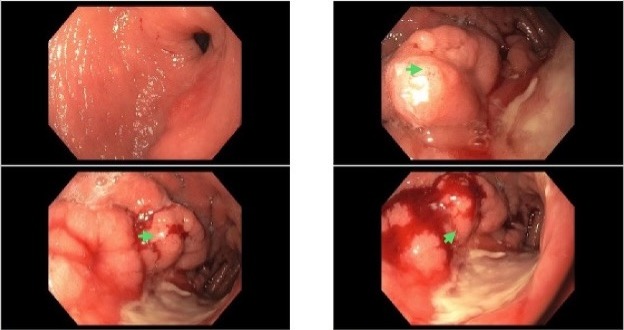Monday Poster Session
Category: Stomach and Spleen
P4222 - CA 19-9-Producing Gastric Adenocarcinoma With Peritoneal Metastases: An Elusive Diagnosis
Monday, October 27, 2025
10:30 AM - 4:00 PM PDT
Location: Exhibit Hall

Lefika Bathobakae, MD, MPH
St. Joseph's University Medical Center
Paterson, NJ
Presenting Author(s)
Lefika Bathobakae, MD, MPH1, Henry Alocha, MD1, Atang Koodirile, MD2, Angela Vidreiro, MD3, Rossalee Dominguez, BSN4, Kamal Amer, MD5, Walid Baddoura, MD1
1St. Joseph's University Medical Center, Paterson, NJ; 2American University of Antigua College of Medicine, Paterson, NJ; 3Morristown Medical Center, Morristown, NJ; 4St. George's University, Paterson, NJ; 5St. Joseph’s University Medical Center, Paterson, NJ
Introduction: Carbohydrate antigen 19-9 (CA 19-9) is a tetrasaccharide produced by exocrine epithelial cells in the esophagus, stomach, pancreas, and biliary ducts.1,2 This marker is currently used to diagnose and prognosticate pancreatic cancer.2,3 CA 19-9-producing gastric adenocarcinoma (CA 19-9 GA) is exceedingly rare and most cases originate in East Asia.1,3–5 Herein, we describe a unique case of CA 19-9 GA with potential familial clustering.
Case Description/
Methods: A 33-year-old man with a family history of gastric cancer presented to the ED complaining of epigastric pain for one month. The abdominal pain worsened with food intake was associated nausea, vomiting, a 40-pound weight loss. On exam, the patient appeared jaundiced with icteric sclera, and the abdomen was diffusely tender to palpation. Triage labs: AST, 286 unit/L, ALT, 369 unit/L, alkaline phosphatase, 834 unit/L, and CA 19-9, 739 U/mL. Diagnostic imaging showed a distended gallbladder with a large amount of sludge and small ascitic fluid in the RUQ.
MRCP showed a complex collection in the right anterior abdominal wall with no evidence of ductal dilatation. EGD showed erythema and erosions in the gastric antrum and irregular polypoid gastric mucosa, concerning for an infiltrative disorder (Figure 1). Surgical pathology revealed a poorly differentiated invasive adenocarcinoma of the stomach. Diagnostic laparoscopy revealed diffuse peritoneal metastases and a large gastric mass along the lesser curvature of the stomach. The patient was diagnosed with CA 19-9 GA with peritoneal metastases, and completed four cycles of palliative chemotherapy before being transitioned to hospice care due to worsening clinical status.
Discussion: CA 19-9 GA is a rare and aggressive subtype of gastric cancer with early metastasis and poor prognosis. Currently, there are no standardized treatment regimens for the advanced stages of the disease. CA 19-9 is most recognized as a biomarker for pancreaticobiliary malignancies, but its elevation in non-pancreatic cancers, remains an underrecognized phenomenon. In this case, markedly elevated serum CA 19-9 levels initially raised concern for pancreatic carcinoma; however, imaging and histopathologic findings ultimately revealed gastric cancer with diffuse peritoneal carcinomatosis. The diagnostic challenge lay in the nonspecific clinical presentation and misleading biomarker profile, underscoring the importance of a broad differential diagnosis when interpreting tumor markers.

Figure: Figure 1. Endoscopy images showing friable, large irregular polypoid mucosal folds in the gastric body and erythema and erosions in the gastric antrum.
Disclosures:
Lefika Bathobakae indicated no relevant financial relationships.
Henry Alocha indicated no relevant financial relationships.
Atang Koodirile indicated no relevant financial relationships.
Angela Vidreiro indicated no relevant financial relationships.
Rossalee Dominguez indicated no relevant financial relationships.
Kamal Amer indicated no relevant financial relationships.
Walid Baddoura indicated no relevant financial relationships.
Lefika Bathobakae, MD, MPH1, Henry Alocha, MD1, Atang Koodirile, MD2, Angela Vidreiro, MD3, Rossalee Dominguez, BSN4, Kamal Amer, MD5, Walid Baddoura, MD1. P4222 - CA 19-9-Producing Gastric Adenocarcinoma With Peritoneal Metastases: An Elusive Diagnosis, ACG 2025 Annual Scientific Meeting Abstracts. Phoenix, AZ: American College of Gastroenterology.
1St. Joseph's University Medical Center, Paterson, NJ; 2American University of Antigua College of Medicine, Paterson, NJ; 3Morristown Medical Center, Morristown, NJ; 4St. George's University, Paterson, NJ; 5St. Joseph’s University Medical Center, Paterson, NJ
Introduction: Carbohydrate antigen 19-9 (CA 19-9) is a tetrasaccharide produced by exocrine epithelial cells in the esophagus, stomach, pancreas, and biliary ducts.1,2 This marker is currently used to diagnose and prognosticate pancreatic cancer.2,3 CA 19-9-producing gastric adenocarcinoma (CA 19-9 GA) is exceedingly rare and most cases originate in East Asia.1,3–5 Herein, we describe a unique case of CA 19-9 GA with potential familial clustering.
Case Description/
Methods: A 33-year-old man with a family history of gastric cancer presented to the ED complaining of epigastric pain for one month. The abdominal pain worsened with food intake was associated nausea, vomiting, a 40-pound weight loss. On exam, the patient appeared jaundiced with icteric sclera, and the abdomen was diffusely tender to palpation. Triage labs: AST, 286 unit/L, ALT, 369 unit/L, alkaline phosphatase, 834 unit/L, and CA 19-9, 739 U/mL. Diagnostic imaging showed a distended gallbladder with a large amount of sludge and small ascitic fluid in the RUQ.
MRCP showed a complex collection in the right anterior abdominal wall with no evidence of ductal dilatation. EGD showed erythema and erosions in the gastric antrum and irregular polypoid gastric mucosa, concerning for an infiltrative disorder (Figure 1). Surgical pathology revealed a poorly differentiated invasive adenocarcinoma of the stomach. Diagnostic laparoscopy revealed diffuse peritoneal metastases and a large gastric mass along the lesser curvature of the stomach. The patient was diagnosed with CA 19-9 GA with peritoneal metastases, and completed four cycles of palliative chemotherapy before being transitioned to hospice care due to worsening clinical status.
Discussion: CA 19-9 GA is a rare and aggressive subtype of gastric cancer with early metastasis and poor prognosis. Currently, there are no standardized treatment regimens for the advanced stages of the disease. CA 19-9 is most recognized as a biomarker for pancreaticobiliary malignancies, but its elevation in non-pancreatic cancers, remains an underrecognized phenomenon. In this case, markedly elevated serum CA 19-9 levels initially raised concern for pancreatic carcinoma; however, imaging and histopathologic findings ultimately revealed gastric cancer with diffuse peritoneal carcinomatosis. The diagnostic challenge lay in the nonspecific clinical presentation and misleading biomarker profile, underscoring the importance of a broad differential diagnosis when interpreting tumor markers.

Figure: Figure 1. Endoscopy images showing friable, large irregular polypoid mucosal folds in the gastric body and erythema and erosions in the gastric antrum.
Disclosures:
Lefika Bathobakae indicated no relevant financial relationships.
Henry Alocha indicated no relevant financial relationships.
Atang Koodirile indicated no relevant financial relationships.
Angela Vidreiro indicated no relevant financial relationships.
Rossalee Dominguez indicated no relevant financial relationships.
Kamal Amer indicated no relevant financial relationships.
Walid Baddoura indicated no relevant financial relationships.
Lefika Bathobakae, MD, MPH1, Henry Alocha, MD1, Atang Koodirile, MD2, Angela Vidreiro, MD3, Rossalee Dominguez, BSN4, Kamal Amer, MD5, Walid Baddoura, MD1. P4222 - CA 19-9-Producing Gastric Adenocarcinoma With Peritoneal Metastases: An Elusive Diagnosis, ACG 2025 Annual Scientific Meeting Abstracts. Phoenix, AZ: American College of Gastroenterology.
